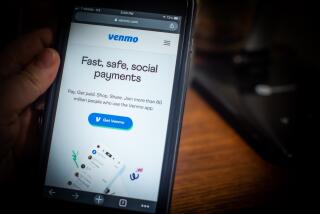Banks’ reserves of trust getting low
- Share via
By his own admission, Simi Valley resident Vince Asturi knew he had nothing to worry about when federal authorities took over IndyMac Bank.
Asturi, 78, and his wife had less than $100,000 in assets at the Pasadena-based institution, and he understood that all their cash was thus covered by the Federal Deposit Insurance Corp.
Nevertheless, Asturi spent three days last week trying to get inside IndyMac’s Northridge branch. And when he finally made it to a teller’s window Wednesday, he immediately withdrew all his money.
“I just didn’t trust the bank,” Asturi told me. “I was disgusted by the way this whole thing was handled.”
The extent to which consumers trust their own banks -- or not -- may determine whether we’ll see more IndyMacs in the weeks ahead.
Thousands of IndyMac customers lined up in the hot sun to pull their money from the bank after it was taken over by the FDIC on July 11. Federal regulators seized control after determining that IndyMac wouldn’t be able to meet depositor demand.
Like Asturi, almost all IndyMac customers were in no danger of losing their money. They either had less than $100,000 in the bank or had structured their larger accounts to be fully insured.
But those pulling their funds out made no distinction between failed IndyMac Bank and the newly created, FDIC-run IndyMac Federal Bank. To them, a bank is a bank, and this one was no longer reliable.
A recent survey by J.D. Power and Associates found that customer satisfaction with banks has fallen significantly since last year, with fees, long wait times and poor problem resolution cited as the most common complaints.
“When banks were smaller, when you knew the man or woman behind the counter, it was easier to trust them,” said Linda Sherry, a spokeswoman for Consumer Action. “Now you don’t know who’s who.”
Arcadia resident Arnold Cohn, 81, had well over $100,000 in assets at IndyMac, but he said he’d structured his accounts so that the entire amount was insured. Yet there he was on Monday, waiting in line all day to withdraw his funds.
“I’ve just gotten to a point where I don’t trust banks any more,” he said.
The banking industry wants people to keep a cool head.
“One thing all consumers should know is that their money is safe,” said John Hall, a spokesman for the American Bankers Assn. “Is there a crisis in confidence? Yes. But once people get the real story, it will be business as usual.”
Well, that’s the problem. For many bank customers, business as usual means overdraft charges and late fees, a constant nickel-and-diming for every mishap or service.
Lenders collected a record $18.1 billion in credit card penalty fees last year, up 69% from 2003, according to consulting firm R.K. Hammer Investment Bankers in Thousand Oaks.
Business as usual can also mean keeping customers in the dark about important information.
Jill Morgan, 56, watched the IndyMac meltdown play out on TV from her living room in Poway, in San Diego County. That got her wondering about her own savings at Wachovia Bank, where she had more than $400,000.
“I called them up and they told me that most of my money was uninsured,” Morgan said. “This was the first time I’d heard that. They should have told me.”
I know: People should be responsible for their own finances. But the unfortunate reality is that many consumers either don’t make the effort or don’t have the wherewithal to be well-informed money managers.
That’s one reason consumer debt hit an all-time high of $2.59 trillion in the first quarter while the personal savings rate remained below 1% of disposable income.
Simply put, we need all the help we can get. And it’s not unreasonable to think that banks have a responsibility to meet that need.
When was the last time your bank called to inform you of a low account balance? When was the last time your bank advised you on the best way to allocate your funds?
Sure, some banks do this, especially for customers with a significant amount of money on deposit. And many banks will automatically notify you of low balances -- but only if you sign up in advance for the service.
Did you even know such services are offered? Did your bank ever tell you?
Try this little experiment some time: Walk into a bank branch -- any bank -- and ask for a copy of the terms and conditions for the bank’s credit cards. In most cases, a bank will refuse to show you this document until after you sign up for a card, making it impossible to comparison shop for plastic.
How’s that for trustworthiness?
Hall at the American Bankers Assn. pointed to a Gallup poll conducted last year showing that 48% of respondents said they had a great deal or a lot of trust in banks and financial institutions. He said this was evidence that banks are trusted by consumers.
That’s one way of looking at it. Another is to observe that a majority of consumers don’t have a great deal or a lot of trust in banks.
That’s a problem that banks have made for themselves over the years by skimping on customer service. That’s why people were pulling their money from IndyMac last week, even when they had no reason to do so.
That’s why this will happen again.
--
Consumer Confidential runs Wednesdays and Sundays. Send your tips or feedback to david.lazarus@latimes.com.
More to Read
Inside the business of entertainment
The Wide Shot brings you news, analysis and insights on everything from streaming wars to production — and what it all means for the future.
You may occasionally receive promotional content from the Los Angeles Times.









